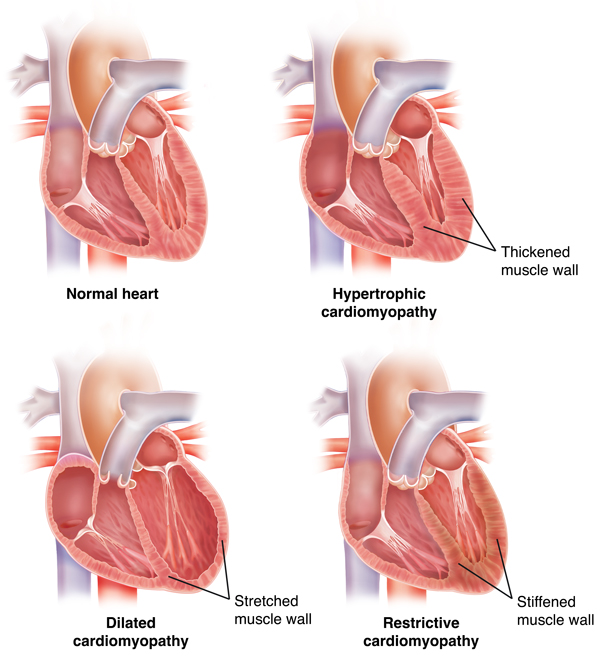Cardiomyopathy
What is cardiomyopathy?
Any disorder that affects the heart muscle is called a cardiomyopathy. Cardiomyopathy causes the heart to lose its ability to pump blood well. In some cases, the heart rhythm also becomes disturbed. This leads to irregular heartbeats (arrhythmias).
How does cardiomyopathy differ from other heart disorders?
Cardiomyopathy differs from many of the other disorders of the heart in several ways:
-
Cardiomyopathy can occur in young people.
-
The condition tends to get worse over time. Sometimes it worsens fairly quickly.
-
It may be connected to diseases involving other organs, as well as the heart.
-
Dilated cardiomyopathy is a leading cause for needing a heart transplant.
-
It's often the result of gradual changes in the structure of the heart over time.
What causes cardiomyopathy?
Cardiomyopathy can happen in several ways as well as being inherited. Viral infections in the heart are a major cause. In some cases, another disease or its treatment causes it. This might include complex heart disease that's present at birth (congenital). It can also include nutritional problems, fast heart rhythms, or certain types of chemotherapy or radiation treatment for cancer.
Sometimes, cardiomyopathy can be linked to a genetic defect. Mutations, or changes in the genes that control how the heart is formed, can cause the heart not to develop in the right way.
Often, the exact cause of the muscle disease is never found. Other causes of cardiomyopathy include:
Three types of cardiomyopathy typically affect adults. They are:

What is hypertrophic cardiomyopathy?
Hypertrophic cardiomyopathy occurs when the muscle of the left ventricle thickens. This can block blood flow to the rest of the body. It can affect the heart's mitral valve, causing blood to leak backward instead of moving forward through the valve.
This is a rare disease and in most cases is inherited. It can affect people of all ages and is more common in men than women. Symptoms can appear in childhood or adulthood.
Symptoms include fatigue, shortness of breath during activity, dizziness, fainting, palpitations (fast or hard heartbeat), and chest pain (angina). Some people have arrhythmias (abnormal heart rhythms), which may lead to sudden death.
What is dilated cardiomyopathy?
Dilated cardiomyopathy is the most frequent form of cardiomyopathy. One or both of the ventricles of the heart are enlarged and stretched, affecting the heart's ability to pump and relax normally.
This occurs most often in adults ages 20 to 60. But it has been diagnosed in people of all ages, including children. It's more common in men than in women. Most people who have it eventually develop heart failure.
Dilated cardiomyopathy can be caused by chronic, heavy alcohol use and nutrition problems tied to alcoholism. It sometimes happens as a problem with pregnancy and childbirth. Other possible causes include alcohol abuse, infections, and illegal drugs. It can also be inherited due to a genetic disorder. Sometimes medicines used to treat a different medical condition can damage the heart and cause dilated cardiomyopathy.
But in most cases, a clear cause is never found.
What is restrictive cardiomyopathy?
Restrictive cardiomyopathy occurs when the heart muscle becomes stiff because of scar tissue that replaces normal heart muscle. Because of this, the ventricles are not able to fill with blood in the right way. Blood flow in the heart is reduced over time. It's the least common type of cardiomyopathy in the U.S.
It often occurs due to a problem such as amyloidosis, hemochromatosis, scleroderma, or sarcoidosis. It does not appear to be inherited, but some of the diseases that lead to the condition are inherited.
Symptoms may include fatigue, swelling of the arms and legs, and trouble breathing during activity.
What is arrhythmogenic right ventricular cardiomyopathy (ARVC)?
ARVC is a rare genetic type of cardiomyopathy. It occurs if the muscle tissue in the right ventricle of the heart dies and is replaced by fat or scar tissue. This disrupts the heart's electrical system, causing an abnormal heartbeat.
It usually affects teens and young adults.
Symptoms include palpitations and fainting after physical activity. In later stages, it can affect the left ventricle and cause heart failure. It can cause sudden cardiac arrest in young athletes.
It may require a device like an implantable cardioverter-defibrillator (ICD) or pacemaker to prevent death from an arrhythmia.